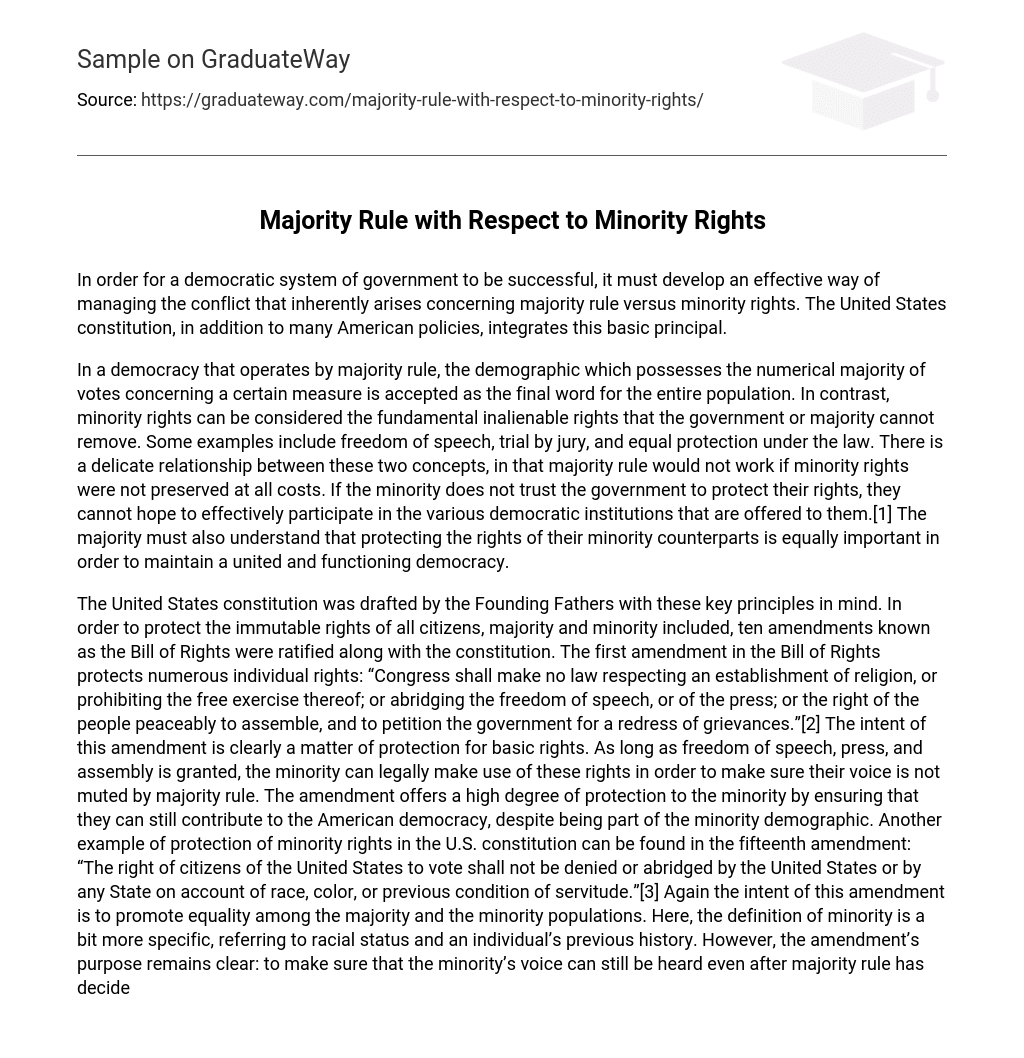In order for a democratic system of government to be successful, it must develop an effective way of managing the conflict that inherently arises concerning majority rule versus minority rights. The United States constitution, in addition to many American policies, integrates this basic principal.
In a democracy that operates by majority rule, the demographic which possesses the numerical majority of votes concerning a certain measure is accepted as the final word for the entire population. In contrast, minority rights can be considered the fundamental inalienable rights that the government or majority cannot remove. Some examples include freedom of speech, trial by jury, and equal protection under the law. There is a delicate relationship between these two concepts, in that majority rule would not work if minority rights were not preserved at all costs. If the minority does not trust the government to protect their rights, they cannot hope to effectively participate in the various democratic institutions that are offered to them.[1] The majority must also understand that protecting the rights of their minority counterparts is equally important in order to maintain a united and functioning democracy.
The United States constitution was drafted by the Founding Fathers with these key principles in mind. In order to protect the immutable rights of all citizens, majority and minority included, ten amendments known as the Bill of Rights were ratified along with the constitution. The first amendment in the Bill of Rights protects numerous individual rights: “Congress shall make no law respecting an establishment of religion, or prohibiting the free exercise thereof; or abridging the freedom of speech, or of the press; or the right of the people peaceably to assemble, and to petition the government for a redress of grievances.”[2] The intent of this amendment is clearly a matter of protection for basic rights. As long as freedom of speech, press, and assembly is granted, the minority can legally make use of these rights in order to make sure their voice is not muted by majority rule. The amendment offers a high degree of protection to the minority by ensuring that they can still contribute to the American democracy, despite being part of the minority demographic. Another example of protection of minority rights in the U.S. constitution can be found in the fifteenth amendment: “The right of citizens of the United States to vote shall not be denied or abridged by the United States or by any State on account of race, color, or previous condition of servitude.”[3] Again the intent of this amendment is to promote equality among the majority and the minority populations. Here, the definition of minority is a bit more specific, referring to racial status and an individual’s previous history. However, the amendment’s purpose remains clear: to make sure that the minority’s voice can still be heard even after majority rule has decided on a matter. Without the ability to vote, certain minority groups would have no chance of being heard by anyone, and their desires would remain subsequently unfilled. The fifteenth amendment prevents occurrences such as this from happening.
American policies also reflect the basic democratic principal of majority rule versus minority rights. One recent example is the war in Iraq. Hundreds of thousands of citizens across the country are opposed to sending troops into Iraq, and have demonstrated their resentment through protests in almost every major city. Although majority rule is responsible for electing the officials who decided that war was necessary, the voice of the minority is still being heard loud and clear. The right to dissent is a constitutional guarantee for every citizen of the United States, and is an important mechanism for altering American policies. By voicing their opinions, anti-war activists hope to influence American foreign policy. Another example is a bit different, and involves the American government’s failure to respect the rights of a certain minority population. Recent controversy has surrounded the issue of homosexual marriage in the media. A majority of Americans appear to be unsupportive of this right, but their jurisdiction in this matter is questionable. Marriage could be considered by some to be an indisputable right granted to all persons regardless of sexual preference. However, the government has not done its job to respect the right of the minority in this situation, and has instead let the majority rule completely over the matter.
It is important in any democracy that the principal of majority rule with respect to minority rights be consistently upheld so that the system can work as efficiently as it is designed to. When certain rights are denied, the democracy becomes illiberal and unable to accurately represent and protect all of the citizens it is responsible for.
[1] “Principles of Democracy.” Majority Rule, Minority Rights. U.S. Department of State’s Bureau of International Information Programs. 06 Dec. 2005 <http://usinfo.state.gov/products/pubs/principles/majority.htm>.
[2] “The Bill of Rights.” BillOfRights.org. 06 Dec. 2005 <http://www.billofrights.org/>.
[3] “Amendments to the Constitution.” 20 Sept 2004. United States House of Representatives. 06 Dec. 2005 <http://www.house.gov/Constitution/Amend.html>.





